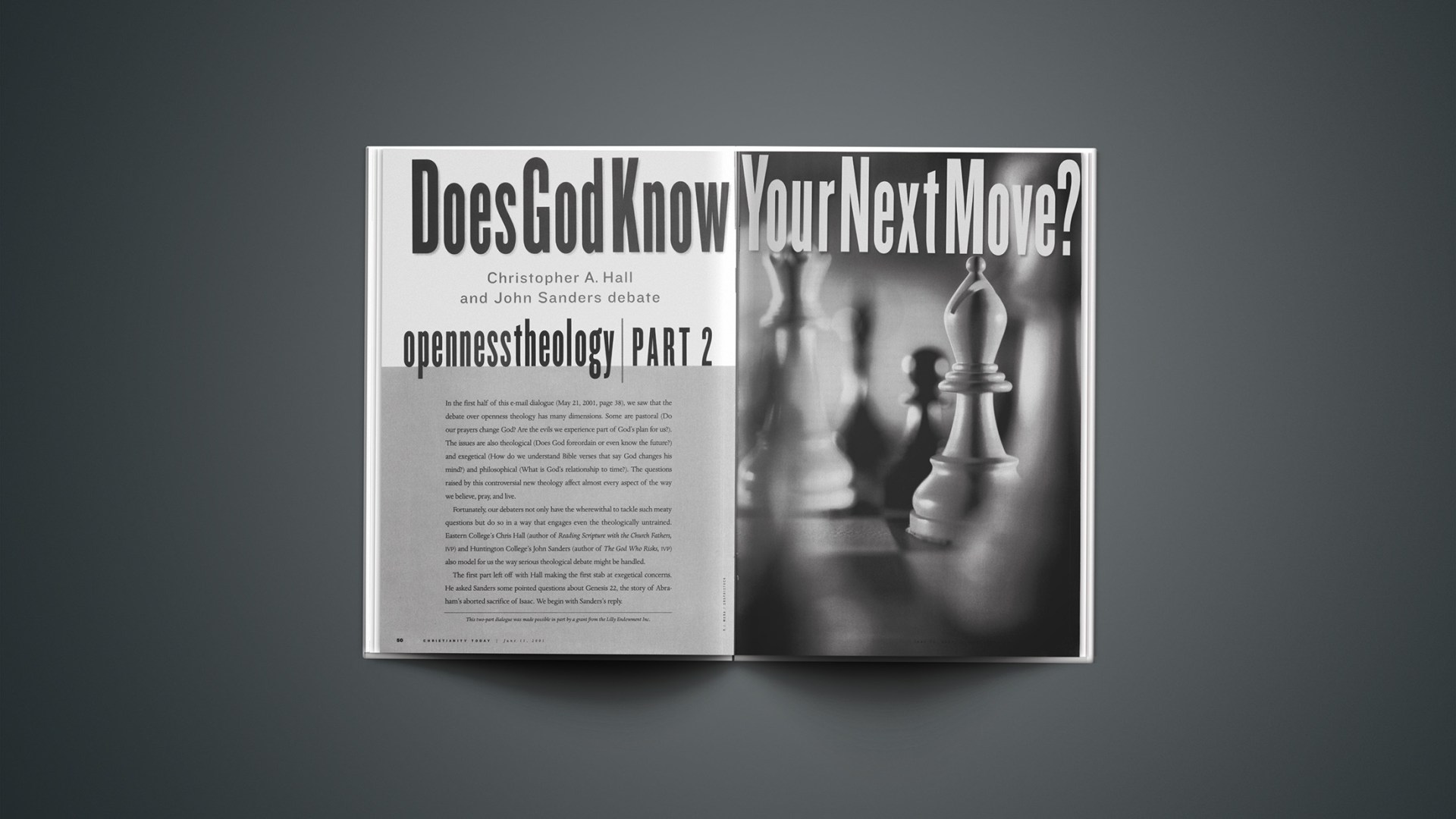Part 1:Introduction | John Sanders 1 | Chris Hall 1 | Sanders 2 | Hall 2
Part 2:John Sanders 3 | Chris Hall 3 | Sanders 4 | Hall 4 | Sanders 5 | Postscript
Dear Chris,
No theological position, including my own, is free of difficulties. Sometimes it comes down to deciding which problems we are willing to live with. However, I don’t believe my problems are as severe as you suggest, and your view has some rather unsavory implications that I shall mention. To begin, you claim that according to Isaiah 41:21-24, what sets God apart from false gods is Yahweh’s ability to know the future. Please read the text carefully along with 46:9-10 and 48:3-5. The glory of Yahweh is not that he simply knows what is going to happen. Rather, it is that he can declare what will happen and bring it about—that it does, in fact, occur. Isaiah is not touting foreknowledge but contrasting Yahweh’s power with the impotence of the other gods.
Next, you are correct that openness modifies traditional Arminian theology regarding divine foreknowledge and timelessness. Nonetheless, we agree with the free-will tradition in Christian theology against those, like you, who deny both that God can be affected by us and that humans have genuine free will. These are the watershed issues in our debate! Thus, we are solidly on the Arminian side of the fence. However, we do have some family squabbles with our fellow free-will theists and only time will tell whether Arminians and openness theists can resolve their differences.
You claim that if God does not tightly control all that we do, and if God does not know with absolute certainty what we shall do in the future, then God just “fumbles along like the rest of us.” This is hardly the case. God knows all the past and all the present completely and has the wisdom and power necessary to work with us, often in spite of us, in order to achieve his purposes. Do we sometimes fail to do what God wants us to do? According to classical theism, no. But according to openness and Arminianism, yes, we can sometimes thwart God’s will. The only way to guarantee that God’s will is never thwarted is for God to micromanage everything, and this is the position of classical theism. Arminianism and openness, however, believe that God grants us free will, and so it is possible that we can go against God’s will.
The key issue is not whether God foreknows what we will do, since Arminians believe God foreknows our evil actions but does not control them. Rather, the crucial point is whether God tightly controls each and every thing we do. As an aside, I’m astounded that our critics fail to realize that many of their criticisms (e.g., we are “Pelagian,” God is not in control, etc.) apply just as much to traditional Arminianism.
Since you believe that nothing happens except what God specifically ordains to occur, you logically conclude that God wants each and every rape, act of incest, and other atrocities to occur. So God wants little girls abused? And you think our view diminishes God’s glory! John Wesley was correct to describe classical theism’s understanding of God’s love as “a love that makes the blood run cold.”
Here are some of the implications of openness theology: God does not want women to be abused or children tortured. God is implacably opposed to sin, but because God does not tightly control us, we can do horrible things to one another, things that grieve God. God does not arbitrarily select some humans for salvation by giving them irresistible grace. Rather, God gives us enabling grace by which we may accept, but can also reject, the divine love. The Scriptures clearly teach that God is open to being influenced by our prayers. In fact, God makes some of his decisions contingent upon our intercessions for one another, so prayer really does make a difference. The openness view places more value on intercessory and petitionary prayer than any other view. The openness view exalts God’s gracious working with us and his entering into genuine give-and-take relations with us. The openness view exalts the true glory of God—the way we see God working with us in Scripture.
Having listed several of our differences, I would be remiss if I failed to observe that, as brothers in Christ, we share much in common. For instance, we both affirm that Jesus is the incarnate Son of God who lived, died, and rose again on behalf of sinners. We both agree on the authority of Scripture, even though we do not interpret every text the same. Moreover, as evangelicals we share belief in the importance of prayer, an active discipleship under the leading of the Holy Spirit, and the need for an ongoing personal relationship with God. Of course, we share more than these in common, but the point is that we share a common core of Christian values and beliefs that make us Christian as opposed to Hindu, and our theological differences must not overshadow our shared Christian faith.
Your fellow follower of Jesus,John
Where Do We Go from Here? A joint postscript, next page.
Copyright © 2001 Christianity Today. Click for reprint information.










